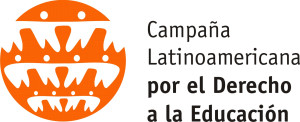
ASPBAE Statement of Solidarity with members and people of Myanmar
February 12, 2021The Asia South Pacific Association for Basic and Adult Education (ASPBAE) stands in solidarity with its members in Myanmar, the Thinking Classroom Foundation and Equality Myanmar, in their resistance to and condemnation of the coup d’etat staged by the Myanmar military on 1 February 2021 which deposed the country’s democratically-elected leaders and subjected the country into a year-long state of emergency in flagrant disrespect of democratic
processes.
The coup averted the convening of the newly-elected Parliament which would have had a stronger presence of the National League for Democracy (NLD). The NLD won a landslide victory in the November 2020 elections, which the military claimed was marred by widespread fraud despite the country’s independent election commission having certified the results and international election observers having deemed the process to have been free and fair.
This brazen act of disregard for democratic principles and human rights by the Myanmar military breaks the tenuous transition to civilian rule started in 2011, after decades of an authoritarian military rule. It also comes at an already difficult time for people in the country reeling under the unprecedented adverse impacts of the COVID-19 pandemic on their health, income, access to food, jobs and over-all well-being.
President Win Myint, State Counsellor Aung San Suu Kyi and hundreds of other political leaders, activists, students and journalists have since been arrested and deprived of their civil liberties. Strategic means of communications were shut down. A number of development workers were also cut off from their organizational headquarters outside the country, sowing an overall feeling of insecurity despite the critical role they play in supporting the country.
In the days following the military coup however, civilian protests and resistance emerged – a sign of hope and affirmation that the people of Myanmar are defying illegitimate military rule. Teachers and labour unions, youth and student groups organized peaceful demonstrations and many have participated in acts of civil disobedience. Civil servants walked out of their work, people in their homes banged pots and pans as a sign of protest, and citizens organised online resistance to the coup – urging everyone, within and outside the country to resist the military regime and defend democracy and human rights at all costs.
We in ASPBAE stand by our civil society members and partners in the country in their fight for democracy and human rights. As a regional network of more than 200 civil society organisations and individuals operating in around 30 countries of the Asia-Pacific, ASPBAE’s core beliefs are founded on the sanctity of human rights and democratic freedoms of the people. Further, through their right to transformative and liberating education and lifelong learning, the people should be empowered with the essential means to combat poverty, fight all forms of discrimination and
authoritarianism, build a culture of peace and enable them to actively participate in development and governance.
We therefore call on our members, partners and the international community to use their voices and influence to:
1. Stand in solidarity with the people of Myanmar and support all forms of solidarity actions that amplify the calls to restore democracy, human rights and people’s well- being in the country.
2. Pressure the Myanmar military to end its unlawful seizure of power and immediately restore democracy and civilian rule in the country by upholding the results of November 2020 elections
3. Demand the immediate release of all detained leaders, activists, students and journalists by dropping all false charges against them and restore their civil liberties
4. Resist any effort by the military to impede or prevent the flow of support services delivered by local, national and international organisations especially to the most marginalised sectors – women and girls, children, ethnic minority groups, people with disabilities, those from the poor communities, the people affected by protracted civil wars in the various parts of the country, and those who continue to suffer from the impact of COVID-19 pandemic
5. Support and stand united with teachers and students who continue to join the efforts of the people and grassroots organisations in conducting various forms of resistance to challenge the military takeover of power ASPBAE is committed to advancing democratic freedoms and human rights for all.
May courage and solidarity sustain the people of Myanmar and all who fight for the restoration of democracy.
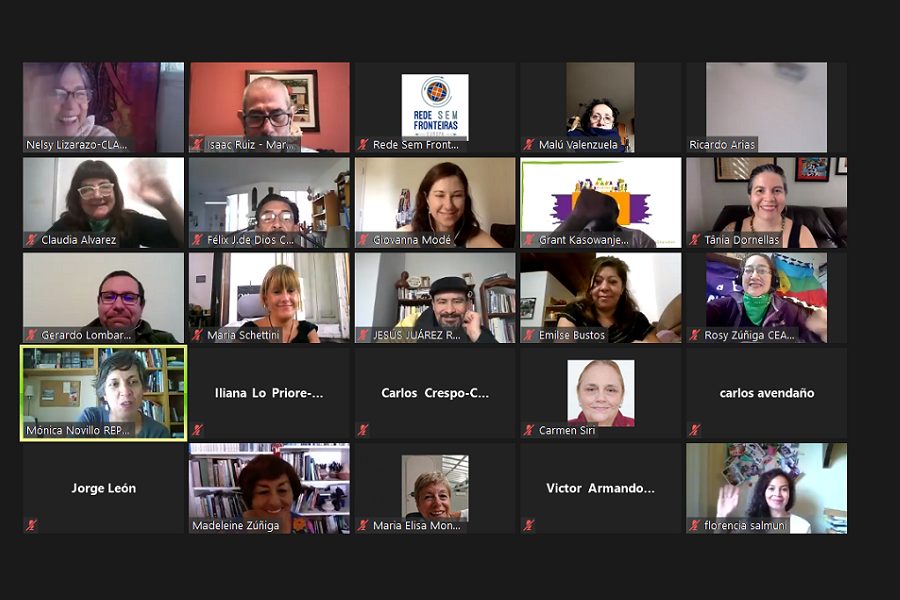
The Assembly “Towards a global agenda: the human right to education from the movements” took place at the World Social Forum 2021.
February 1, 2021With the participation of a hundred delegates from organizations that converge around education as a human right, the self-organized assembly “Towards a global agenda: the human right to education from the movements” was held this Saturday (30) in the framework of the World Social Forum (WSF) 2021.
The activity was organized by the Latin American Campaign for the Right to Education (CLADE), the Council for Popular Education in Latin America and the Caribbean (CEAAL), the Pressenza Agency, the Espacio sin Fronteras Network, the Global March against Child Labour, the Global/Local Network for Quality Education, the Popular Education Network of Women (REPEM), the World Organization for Early Childhood Education (Omep) and Fe y Alegría.
Opening the dialogue, Grant Kasowanjete, Global Coordinator of the Global Campaign for Education, highlighted the need to ensure increased funding for public education in the countries of the global South as one of the main challenges to realizing the human right to education.
She pointed out that “for every dollar of aid that arrives from the global North, ten dollars are taken away through foreign debt and other mechanisms”, which erodes public coffers and underfunds the system, since 90% of education budgets come from own resources.
Nelsy Lizarazo, from the general coordination of CLADE, emphasized the deepening as result of the pandemic, of pre-existing inequality gaps and a refinement of stratification and exclusion from the educational pathway in social sectors lacking support, connectivity or adequate equipment, highlighting rural populations, migrants, indigenous people and people with disabilities, among others.
At the same time, she indicated how governments have handed over millions of dollars and data to corporations, information that will feed the already enormous business of these technology multinationals. She also added that the emergency has meant a greater precariousness of the teaching condition with budget reductions, salary reductions, a heavier workload, to which is added the psychological pressure produced by the effort of educators to respond to and overcome the difficulties posed by the technological and pedagogical challenge of distance education.
On the basis of these characterizations, the question of the learning, strengths and challenges identified in this course was launched as a trigger.
In a first round of interventions, key aspects such as the lack of infrastructure and the need for community technological development independent of large corporate platforms, the damage caused by the exclusion of millions of children from the educational process or the dysfunctionality of homogeneous educational planning in the face of the complexity of diverse realities were pointed out.
Among the lessons learned, the imaginative capacity of the educators who managed to overcome adverse conditions, the propensity for knowledge of children beyond the institutional framework, the importance of dialogue and joint work between school, parents and community, the role of community education together with the favorable impact of progressive political projects in the face of the failure of the neoliberal system were valued.
The assembly continued its collective reflection on the priority agenda of the regions and what is common to these agendas.
In a fluid and propositional dialogue, the participants indicated that the struggle must lead first and foremost, in the face of the prevailing violence in different territories, to guaranteeing the right to life. Likewise, to overcome inequality at educational levels within the social system, to offer safe educational spaces, free of aggression and abuse for girls and boys, and to strengthen a new non-predatory social relationship.
The need to promote a political-pedagogical revolution in the face of neoliberal agendas was also pointed out, as well as the need to strengthen intergenerational dialogue, especially in relation to older adults and the importance of implementing Comprehensive Sex Education as a mechanism to overcome sexual violence against girls, adolescents and women in general.
On the other hand, global priorities included the struggle to ensure that the right to education is not minimized, the defense and strengthening of the public system and counteracting the fallacy that private systems are better, overcoming inequality and discrimination in education, and guaranteeing adequate funding for education from a human rights perspective.
When analyzing possible cross-cutting themes for common action, the indivisibility of human rights was emphasized and, consequently, it was proposed to promote broad alliances by interweaving struggles with the agendas of other rights while contributing to strengthening social organization and mobilization. The importance of continuing to generate knowledge by connecting it with messages and campaigns that mobilise demands was highlighted.
In the same way, a suggestion was made in the debate for a greater exchange on the modalities used to make good practices visible and to achieve effective impact in relation to the demands put forward.
Among the proposals for joint action, the creation of an observatory, the promotion of liberating education in the presence of Paulo Freire’s centenary, the opening of spaces for the expression of the new generations and the idea of Good Living were suggested. Political action is needed to rethink education in terms of feminism and socio-economic equity, and to articulate the forces to overcome not only the physical but also the mental illness from which humanity suffers.
Finally, the Assembly approved a text to be proposed and included in the final declaration of the World Social Forum 2021.
“In the framework of this WSF 2021, we join the agenda of transformation at the global level, articulated to the various fields of social struggle and rights, recognizing the catalytic role of education. The pandemic highlighted the historical inequalities within and outside education systems, affecting women, girls, people with disabilities, refugees and migrants, indigenous communities, rural populations, among others. It also highlighted the digital divide and government responses to it, as well as the need to build a digital sovereignty strategy.
Through strengthened public education systems, it is necessary to resist the threats of fiscal austerity policies, national indebtedness and cuts in education funding, as well as the multiple trends of privatization. From early childhood through to youth and guaranteeing adult education, it is essential, in the post-pandemic period, to rethink the meaning and purpose of education, in the search for the rights of peoples and overcoming patriarchy. A heterogeneous and intercultural model, transformative and inclusive; based on dialogue and safe for communities; valuing their knowledge and local knowledge, as well as collaboration in solidarity and commitment to the protection of life”.
Video:
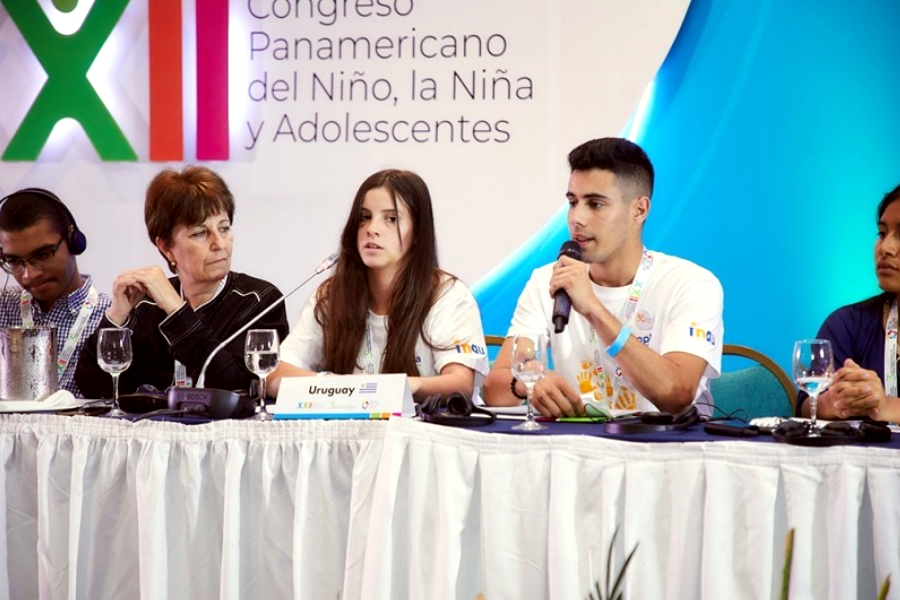
What are Latin America and Caribbean students’ thoughts on education and other human rights?
November 11, 2019Overcoming discrimination and violence, the right to play, art and recreation, gender equality and the right to comprehensive sexuality education and to participate in the debates on public policies affecting them: these were some of the demands shared by boys, girls, adolescents and youths during the 22nd Pan-American Child Congress and the Third Pan-American Child Forum that were held from Oct. 29-31 in Cartagena (Colombia).
(more…)
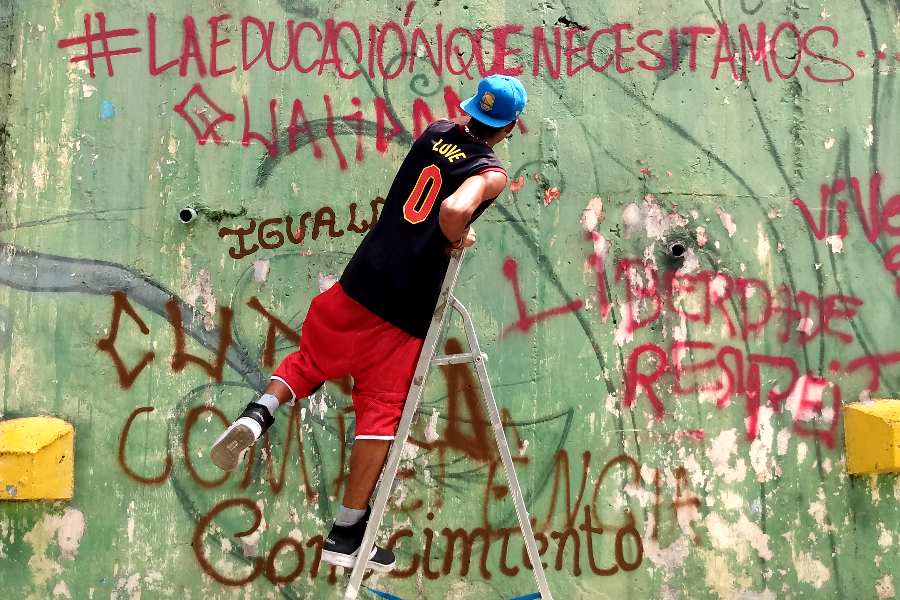
Students from Sao Paulo discuss the education they need for the world they want
November 4, 2019initiative “The education we need for the world we want”, CLADE was last Thursday, Oct. 31, at the Public School Professora Maria Augusta Corrêa, in Sao Paulo, Brazil. This public education center is one of the most diversified in the city, with a high percentage of migrant students, especially from Bolivia and Haiti.
(more…)
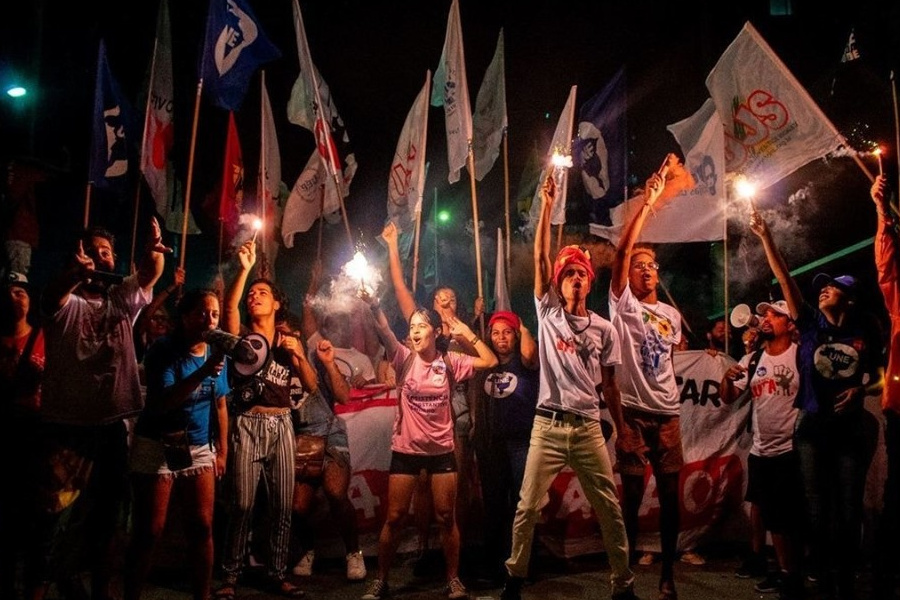
Brazil: Students, teachers unions and civil society lead the struggle for the right to education
August 16, 2019On this World Humanitarian Day, we affirm that the student, education professionals and civil society-led mobilizations that took place across the country on August 13 are a strong reaction and a sign of resistance to a government that has been making great strides towards a not desired past.
This moment is one of a huge crisis in the Brazilian democracy. Not that we haven’t experienced crisis in the past, but what we have witnessed since the impeachment of president Dilma Rousseff in 2016 is the country’s democratic foundations and institutions being weakened and a backsliding in social achievements. We had never advanced so far in strengthening democracy and advancing social rights, and we had never seen setbacks at such a rapid pace.
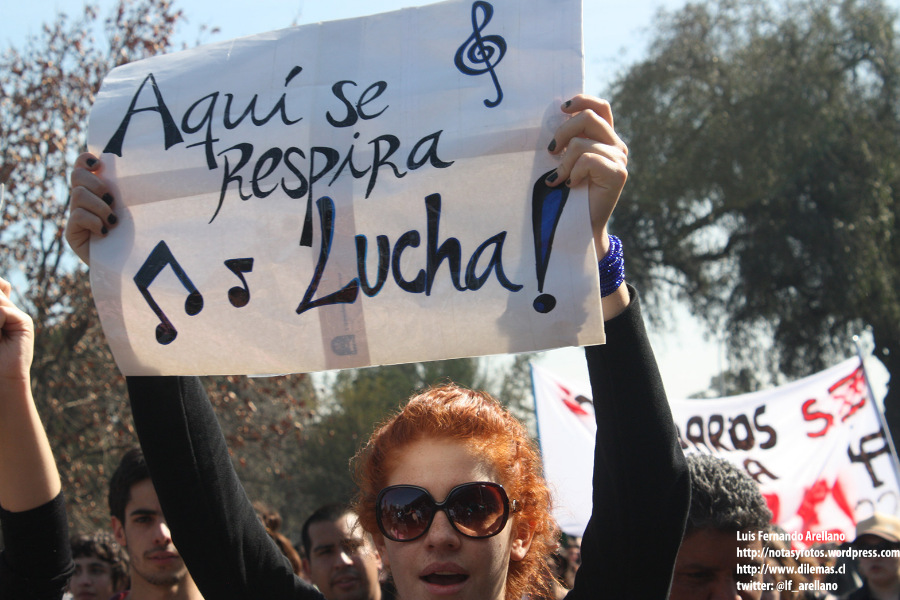
Youth from Latin America and the Caribbean transforming education
August 12, 2019In 1999, United Nations General Assembly appointed August 12 as the International Youth Day, an annual celebration aimed at promoting the role of youth in processes of change, as well as raising awareness on the challenges and contexts faced by young people.
(more…)
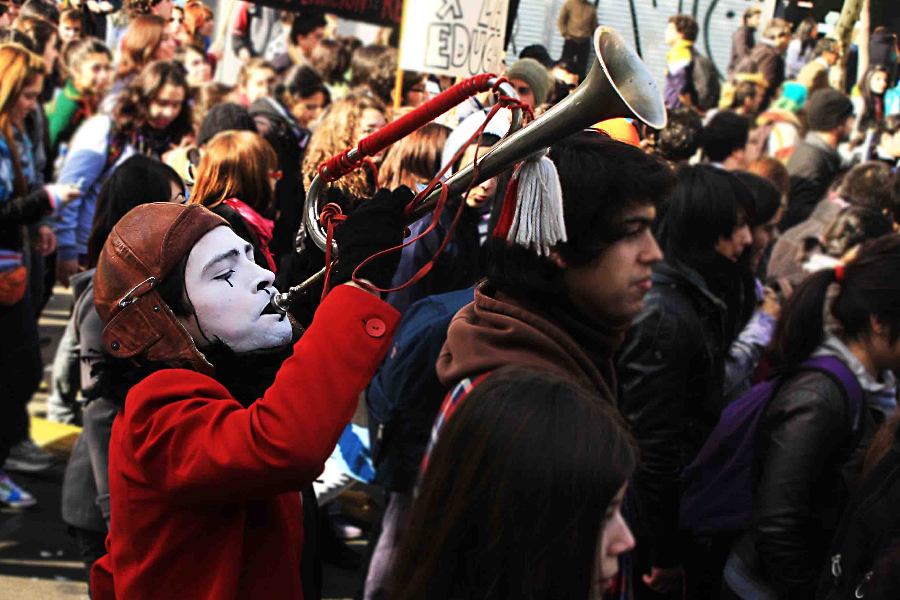
In new publication, CLADE shares experiences, strategies and lessons learned on the fight for the right to education
July 10, 2019The Latin American Campaign for the Right to Education (CLADE) launches the publication “Civil Society Advocacy for the Human Right to Education: Stories and Lessons Learned from Latin America and the Caribbean – Volume 3”.
The document is available:
In this volume, members of CLADE tell their experiences on the fight for the right to education: the challenges, advances and lessons learned, the strategies and recommendations that remain for other civil society movements and organizations. It presents cases of advocacy, communication, research and mobilization in 10 countries of Latin America and the Caribbean, as well as 3 regional experiences, driven by CLADE and 2 regional networks that are members of the Campaign: Espacio sin Fronteras and ALER.
The document is the result of a permanent effort by CLADE, to record and provide visibility to the journey of its members in their advocacy and capacity building efforts; and, on the other hand, to promote the reflection on their success and mistakes, in a process of self-evaluation and capacity building by the network.
“In times when we witness a growing democratic weakness in Latin America and the Caribbean, when laws are passed to hinder the right to demonstration and social participation, when social movements, activists and students are persecuted and criminalized, and there are so many restrictions to participation, it is worth showcasing civil society action and its positive impact on education policies,” says CLADE.
The Campaign distributed the publication, during its participation in the High-Level Political Forum, which takes place until July 18 in New York, with an emphasis on reviewing the status of compliance with Sustainable Development Goal 4, related to education.
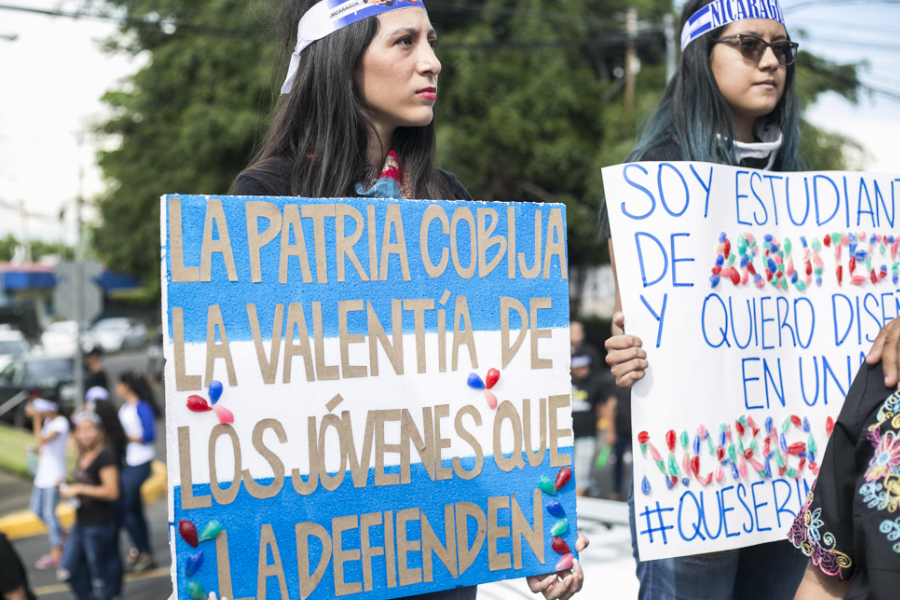
Nicaragua: Forum carries out advocacy actions for education and social participation in partnership with students and youth
February 27, 2019A thematic roundtable on higher education was established within the coalition to strengthen the capacities of young people as leaders of student movements (more…)
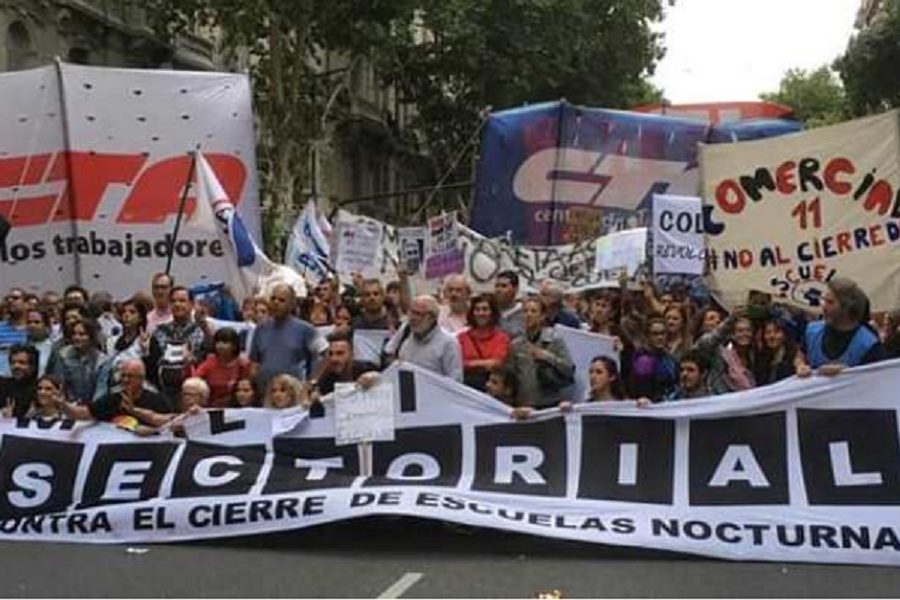
Argentina: Educational communities in Buenos Aires succeed in canceling the closure of evening public schools
February 12, 2019Students, education workers, and the Argentinian coalition CADE celebrate the result of their fight against a resolution of the city’s Ministry of Education, which had established the closure of public schools
(more…)





